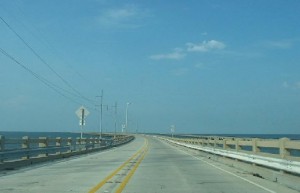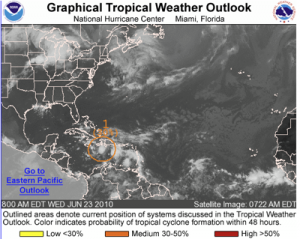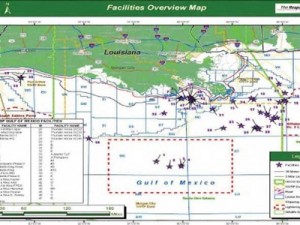The BP oil spill is responsible for health problems and financial hardship for Gulf Coast residents that may continue well after the cleanup work is finished, according to a team of researchers at the National Center for Disaster Preparedness at Columbia University’s Mailman School of Public Health. The researchers found that one in five residents surveyed earn less money now than before the spill; 8% of the 1,200 people surveyed lost their jobs. Households with incomes of less than $25,000 suffered the greatest economic impact. The economic stress felt by the parents trickles down to the children; one-third of the parents surveyed reported that their children have become anxious or depressed since the oil spill occurred. In addition to the psychological stress, medical problems, such as respiratory ailments and skin irritations, are related to the spill. The Children’s Health Fund is sending mobile pediatric units to help. “There are literally no pediatricians in the lower two-third of Plaquemines Parish, Louisiana, one of the worst-hit areas,” according to Irwin Redlener MD, the lead researcher of the National Center on Disaster Preparedness. Sadly, these difficulties appear likely to continue long after the disaster has receded from the newspaper headlines. As a society, we have not yet come to grips with the long-term needs of disaster recovery.
Posts Tagged ‘Gulf Coast Oil Spill’
Effects of the Oil Spill on Children
Sunday, October 17th, 2010The More Things Change..
Sunday, October 10th, 2010A draft report released by a White House commission charged with examining the government’s response to the Gulf Coast oil spill revealed responses that are consistent in our national approach to disasters:
- An initial assessment by the White House that was “over-optimistic” as to the extent of the damages, resulting in delays in bringing the necessary resources to bear in containing the damage;
- The government’s initial reports to the public concerning scientific data on the spill damage were misleading; and
- Conflicts between state and local officials and the federal government confounded recovery work.
The New Orleans Times-Picayune presents an excellent summary of the report. With respect to disaster response and recovery, we are simply wasting too many resources reinventing the wheel. You could redact the words “oil spill” from the report and replace them with “Hurricane Katrina” and the findings would be largely unchanged. We need a forward-looking approach to disaster response that reflects what we have learned to date.
Hitting It Out of the Park
Tuesday, September 28th, 2010Having blogged about the disastrous consequences of the BP oil spill to small businesses in the Gulf Coast states, I was delighted to read this morning’s announcement of the finalists for the 2010 Online Journalism Awards. The New York Times was nominated for recognition in the category of “Outstanding Use of Digital Technologies for its “Oil Spill Tracker”. I have appreciated the New York Times’ innovative digital platform for timely, up-to-date coverage of the unfolding disaster. Visit the online tracker and you will see tabs across the top organizing information by topic “Where Oil is in the Gulf”, “Where Oil Has Made Landfall”, “Effects on Wildlife”, “Efforts to Stop the Leak”, “Investigating the Blowout” and “Live Video of the Leak”. The time-series information is presented on a very clear, uncluttered map. Press the “Play” button and you see the oil spill movements with a caption by date as to what happened. A helpful legend explains the scale and proportions of the disaster. An interactive graphic element on the right-hand side next to the map dynamically presents how the government’s estimate of the size of the oil spill, changed over time. I loved the creative way of presenting many complex, interrelated pieces of information in a clear, user-friendly format. This could be a textbook example on effective visual communication for graphic design students. I appreciate the commitment of the New York Times to provide consistent, in-depth coverage of the unfolding disaster despite BP’s efforts to limit journalists’ access to information. In case you are wondering, Stefan took photograph on September 24 from a skybox at Yankee stadium. The Boston Red Sox beat the Yankees and I thought this a good image to capture the theme of hitting it out of the park.
The Devil You Know
Sunday, September 26th, 2010Gulf Coast residents who had complained about the glacial speed with which BP paid claims for losses related to the oil spill now appreciate that everything is relative. Since the federal government has assumed responsibility for the claims payments, the process has slowed down. The extent of the anger over the delays and miscommunications became clear at a meeting last month in Orange Beach, Alabama attended by roughly a thousand small business owners from Alabama and Florida’s Gulf Coast. Mayor Tony Kennon called the meeting which was attended by the federal government’s “claims czar” Kenneth Feinberg. Among the many stories related by small business owners, some common themes emerge. The first concerns the severe consequences of delayed claims payments.
As we know from our experience in disaster recovery, cash flow is critical to the survival of small businesses. Florida Governor Charlie Crist was correct to criticize the claims process, saying “I think it would be more appropriate for us (the governor and cabinet) to co-sign a letter encouraging increased urgency. It’s becoming increasingly difficult for (some businesses) to be able to hang on. Twenty billion (the sum of money in the BP claims fund) is no small sum of change, but it’s no good unless it’s utilized.”
Consider what delayed payments mean for employment. In most states, the law requires that employees be paid their wages within two weeks of performing their work. Without the cash to pay wages, small businesses have no choice but to lay off staff. They simply cannot run the risks associated with vague promises for claims reimbursement when they have legal obligations to fulfill.
The second key theme relates to our evolving paradigm of economic losses and physical disasters. After 9-11, the Federal Emergency Management Agency was unable to come to grips with the consequences of business interruption and income losses to small businesses. Their view was the economic losses correlated with physical damage. But this is an anachronism: certain service-related businesses located in the World Trade Center suffered total losses of property. But because their work was not location-dependent and because they had appropriate backup, they were able to resume operations. Other businesses, slightly more removed from the scene of the disaster, such as restaurants and retail shops, sustained little or no physical damage. But the interruption of convenient access to their businesses caused severe losses in income. Nine years later and our government has made no progress in its understanding of business interruption losses. The administrator of the BP claims fund, Kenneth Feinberg had stated that claims from business not in the immediate proximity of the disaster would not be paid. The problem, of course, is that the entire Gulf Coast tourism industry lost business this summer because of perceptions about the oil spill, even though many of the beaches were free of oil.
The third theme relates to how we compensate losses incurred by businesses with very short operating histories. The Daily Beast reported the story of Keith Brooks who had launched a new web-based business, YourFloridaEmeraldCoast.com with committed advertisers on board – until the Deepwater explosion. His claim for business losses was challenged, but finally documented to the satisfaction of the BP adjuster. Then it was turned over to the federal government’s management and the process began all over again. In the first edition of Prepare for the Worst, Plan for the Best: Disaster Preparedness and Recovery for Small Businesses, we presented the example of the Lower Manhattan pizza parlor that opened for its first and last day of business on September 10, 2001. Our startup businesses are the most vulnerable to disasters and yet we need them to resume job growth.
Finally, we need to stop fighting old battles and begin to look forward. In an apparent reference to the 9-11 disaster (in which the famous Dunkin Donuts franchise in Oregon successfully applied for a disaster relief program), Feinberg states that if proximity to the oil spill was not given relevance in the claims process, the claims center would “be inundated with claims from 50 states.” True enough, but is it fair that small businesses in the Gulf Coast states should be punished as fearful government employees made blunders with claims payments in previous disasters?
If there is one lesson from this experience, it is that our inability to learn from our past is becoming increasingly costly, both in human and in financial terms. We need a comprehensive and forward-looking plan for disaster relief programs.
“Rapid” Response is Not Fast Enough
Friday, July 23rd, 2010ExxonMobil, Chevron, ConocoPhillips and Shell Oil Company pledged $1 billion to create a “rapid response system” to address any future oil spills in the Gulf of Mexico. The system is still under development, but preliminary plans calls for “capture vessels” to contain and store oil in the event of an underwater well rupture. The system will be operational at depths of up to 10,000 feet with containment capacity of 100,000 barrels daily. The Marine Well Containment Company, a non-profit organization, will operate and maintain the system. The four oil companies plan to begin immediately the engineering and design of the containment equipment and vessels for the system.
No doubt the announcement was welcome by Louisiana Governor Bobby Jindal who spoke at an “Economic Survival Rally” to call for an end to the ban on deep sea drilling for oil and natural gas. Jindal estimated that the ban could cause the loss of 20,000 jobs in Louisiana over the next year. The situation with Louisiana’s oil and gas industry is analogous, in some respects, to our own situation in New York City. An entire ecosystem of small businesses is built around the principal industries of oil and gas in Louisiana and financial services in New York. When that mainstay industry experiences a reversal of fortune, the consequences to the community small businesses are especially severe. The difference, of course, is that we need energy to fuel our economy. Arguably, reduced employment on Wall Street, while painful locally in New York, might not be bad for the rest of the country.
Painful Symbolism at the Twin Span Bridge
Thursday, July 8th, 2010Tar balls from the oil spill in the Gulf of Mexico have entered Lake Pontchartrain where they have been seen as far away as Slidell, a community west of the Twin Span Bridge. The barges placed at the Rigolets were apparently unable to stop the advance of the tar balls; workers have removed more than 1,500 pounds of the oily waste from the lake. Local officials believe that dispersants pushed the tar balls under water, which then advanced and resurfaced past the protective wall of the barges at the Rigolets. Recovery workers may have to reconsider the benefits of using dispersants to break down the oil in the Gulf of Mexico.
Lake Pontchartrain is a robust ecosystem of water life and residents enjoy fishing and crabbing in the area. But beyond the environmental damage, the presence of the tar balls floating past the Twin Span Bridge must be emotionally upsetting for the symbolism. Rebuilding the Twin Span Bridge after Hurricane Katrina destroyed it was a top priority, as it is critical to inter-state commerce. No doubt Louisianans are reliving their most awful days as the tar balls in the lake float past the bridge.
Morale in the Gulf Coast
Wednesday, June 23rd, 2010Residents of Louisiana must be on pins and needles as their fate is decided. A judge overturned the moratorium on offshore drilling imposed by the federal government, which government action caused additional hardship for the state, as it depends on the jobs and taxes generated by the oil industry. And the rest of the country would share the pain, as recent research by the energy analysts of Goldman Sachs found that a ban on offshore drilling would reduce expected oil production by one-half by 2015. As long as we depend on fossil fuels to meet our energy needs, a complete ban appears shortsighted. Even worse, according to the State Department, the administration declined offers put forward by 30 countries and international organizations to assist in containing and cleaning the oil spill.
The White House indicated that it plans to appeal the ruling. A news report that the judge who overturned the moratorium may have undisclosed financial ties to the oil industry likely strengthens the government’s position. And just when you think that the news cannot be worse for the Gulf Coast, the National Oceanic and Atmospheric Administration reports a 30% likelihood that a tropical wave coming from Haiti may develop into a serious cyclone. A hurricane would only worsen the environmental crisis, as high winds and storm swells could spread the contaminants.
But for the fishing and tourism industries, the storm has already hit. CNN reports that P&J Oyster Company, a business in the heart of New Orleans’ French Quarter that has been operating for 134 years, was forced to close. A study published by Texas A&M University Press reports that the four largest industries in the Gulf of Mexico, accounting for $230 billion in economic activity annually, are oil, tourism, fishing and shipping. It may be years, according to the report, if not decades, before these industries fully recover. No wonder USA Today reports of the importance of keeping up morale in the region; recovery will be a long and tough process.
A Tin Ear in Washington
Monday, June 21st, 2010
Kenneth Feinberg, the man appointed by President Obama to administer a $20 billion fund to compensate Gulf Coast oil spill victims, promised to speed claims payments even as a federal judge considers a lawsuit to lift the moratorium on offshore drilling. The U.S. Department of the Interior stopped the approval of any new permits for deepwater drilling and suspended drilling at more than 30 existing exploratory wells in the Gulf of Mexico. But Hornbeck Offshore Services of Louisiana filed a lawsuit in which it claimed that the government acted arbitrarily without any proof that the operations posed a safety risk. Hornbeck claims that the moratorium causes additional hardship to Louisiana, which stands to lose thousands of jobs in the oil and gas industry, even as its fishing and tourism industries are already devastated by the oil spill. Today, Judge Martin Feldman heard arguments in the case in New Orleans federal court. He will issue his ruling by Wednesday. Louisiana Governor Bobby Jindal filed a brief with the court supporting the plaintiffs’ lawsuit. What is most outrageous about the federal government is that it did not consult Louisiana officials before imposing the moratorium, in violation of federal law. U.S. District Judge Nancy Atlas in Houston listened to the New Orleans court hearing today by telephone. She is hearing a similar case against the federal government filed by a Texas-based operator of drilling rigs. Let’s hope that the judges send the federal government a clear message about abuse of power and overreach.
The Economist Reports on Louisiana Oysters
Friday, June 11th, 2010On June 6, I wrote a blog posting about the importance of perception with respect to the safety of seafood harvested in the Gulf Coast. Today, The Economist asks “No mo’po’?” meaning “no more poor boys?” reflecting concerns about the fate of Gulf Coast oysters after the Deepwater Horizon spill. The po’boy, or poor boy, is a sandwich for which Louisiana is famous. My favorite is served at Brennan’s in New Orleans. Fresh oysters harvested from the Gulf Coast, which have a uniquely sweet flavor, are served in a sandwich made with French baguette breads. The taste is exquisite. The five Gulf Coast states (Texas, Louisiana, Mississippi, Alabama and Florida) harvest more than 20 million pounds of oysters annually, which sell on the market for about $60 million. Two-thirds of the oysters consumed in the U.S. come from the Gulf and while oysters are a less valuable harvest than shrimp, they are more difficult to replace. But the immediate concern, reports one fisheries owner quoted in the article, is the perception that the oysters are not safe to eat. Media reports of the oil spill have led consumers to shun Gulf Coast seafood, further compounding the economic losses. This is when small businesses in the Gulf Coast need us most; the seafood that has been harvested to date has been collected in areas unaffected by the spill and has been tested by authorities. And the Gulf shore is still a great place to take a vacation. I look forward to my next trip there.
Preliminary Lessons in Crisis Management
Friday, May 28th, 2010The news from the Gulf Coast continues to alarm. The Associated Press reported workers’ accounts of the unfolding tragedy on the Deepwater Horizon drilling rig in the Gulf Coast. Imagine the horror the workers experienced as they attempted to walk across a bloody platform and remove debris from their colleagues’ bodies to see if they were alive and if they could be transported to the lifeboats. It is painful to read, but necessary. The report suggests certain preliminary lessons from the tragedy: first, management was clearly wearing rose-tinted glasses when they did their scenario planning, completely failing to envision a realistic disaster scenario. Second, BP failed to delegate authority to workers for immediate corrective action, resulting in costly delays as critical decisions went up and down the chain of command. Third, management put human safety below procedural formalities, preferring to do roll calls when an immediate evacuation was called for. Fourth, it does not appear that critical safety equipment was regularly tested to ensure its functionality. Fifth, the workers were improperly trained in life-saving procedures. One operator, for example, didn’t know how to detach the life boat from the rig. Everyone should be cross-trained in critical functions as you cannot anticipate in advance who will be available to respond to an emergency and in what capacity. Finally, the federal government abdicated responsibility for appropriate intervention, which decision is all the more baffling given that BP executives have given us no reason for confidence in their judgment calls. It is just a horrifying story all round.







